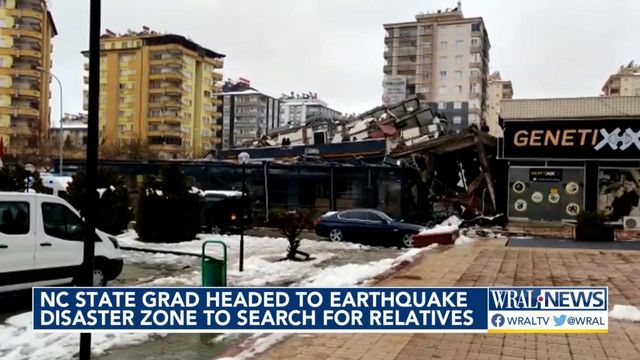'That is my hometown': NC State grad goes home to Turkey to search for survivors after massive quake
Rescuers in Turkey and Syria were desperately combing the rubble in search of survivors after a series of powerful earthquakes collapsed thousands of buildings, killed more than 3,000 people and raised the specter of a new humanitarian disaster.
Posted — UpdatedGAZIANTEP, Turkey — Rescuers in Turkey and Syria were desperately combing the rubble in search of survivors after a series of powerful earthquakes collapsed thousands of buildings, killed more than 3,000 people and raised the specter of a new humanitarian disaster in an area of the world already wracked by war, a refugee crisis, deep economic troubles and near-freezing temperatures.
The initial magnitude 7.8 earthquake hit at 4:17 a.m. local time Monday, according to the U.S. Geological Survey, and was also felt in Cyprus, Egypt, Israel and Lebanon. Dozens of aftershocks, including an unusually strong 7.5 magnitude tremor, struck Turkey in the aftermath, the USGS said.
"This is a part of the world that has a lot of active plate tectonics happening. Most of the world's earthquakes occur around plate boundaries," said Kevin Stewart, associate professor in the department of earth, marine and environmental sciences at the University of North Carolina at Chapel Hill. "In Turkey, there are a number of small, little plates that are interacting, and several plate boundaries meet in that part of eastern Turkey. It's an area with lots of active faults, so with a high risk of large earthquakes like we've seen in the last day."
The earthquakes, centered in southern Turkey, were the deadliest to hit the country in more than 20 years, and the initial shock near the city of Gaziantep was as strong as that of 1939, the most powerful ever recorded in Turkey.
Among the would-be rescuers was Kemal Akoglu, who spoke to WRAL News via Zoom as he made the 10-hour bus ride from Istanbul along with other volunteers.
"I am from there. That is my hometown," he said. Akoglu got his Ph.D. at North Carolina State University and lived in North Carolina for seven years.
He says the airport closest to the earthquake epicenter collapsed, and so did the main hospital, so he could not travel by plane.
"We are going to literally look for the people in the rubble, because there are too many thousands of people," he said. "All my family is there – my mother, father, uncles, and there are several cousins that are still under the debris."
Ismail Arslan, a Turkey native living in High Point, told WRAL News that he has a lot of business connections in his home country.
"We have lots of our textile suppliers, vendors, in the area. There are carpet manufacturers," he said. "I am expecting industry in that area will be affected deeply since lots of buildings collapsed."
Here are other key developments:
— Almost 3,000 buildings collapsed across Turkey alone after the initial quake, President Recep Tayyip Erdogan said. More than 1,760 people died, and 5,000 people were injured. “We do not know where the number of dead and injured can go,” he said.
— In Syria, rescue workers used headlamps and flood lights to work throughout the night. More than 1,250 people were dead and thousands more injured across the country. Turkey also hosts 3.6 million Syrian refugees, the most in the world from that conflict, according to the United Nations refugee agency, which runs one of its largest operations from Gaziantep.
— Videos shared on social media from Turkey and across the border in Syria showed destroyed buildings and rescue crews searching through piles of rubble for survivors. Some people fled their homes in the rain and took shelter in cars in near-freezing temperatures.
— Governments around the world quickly responded to Turkey’s request for international assistance, deploying rescue teams and offers of aid.
Related Topics
• Credits
Copyright 2024 by New York Times News Service and WRAL.com. All rights reserved. This material may not be published, broadcast, rewritten or redistributed.




